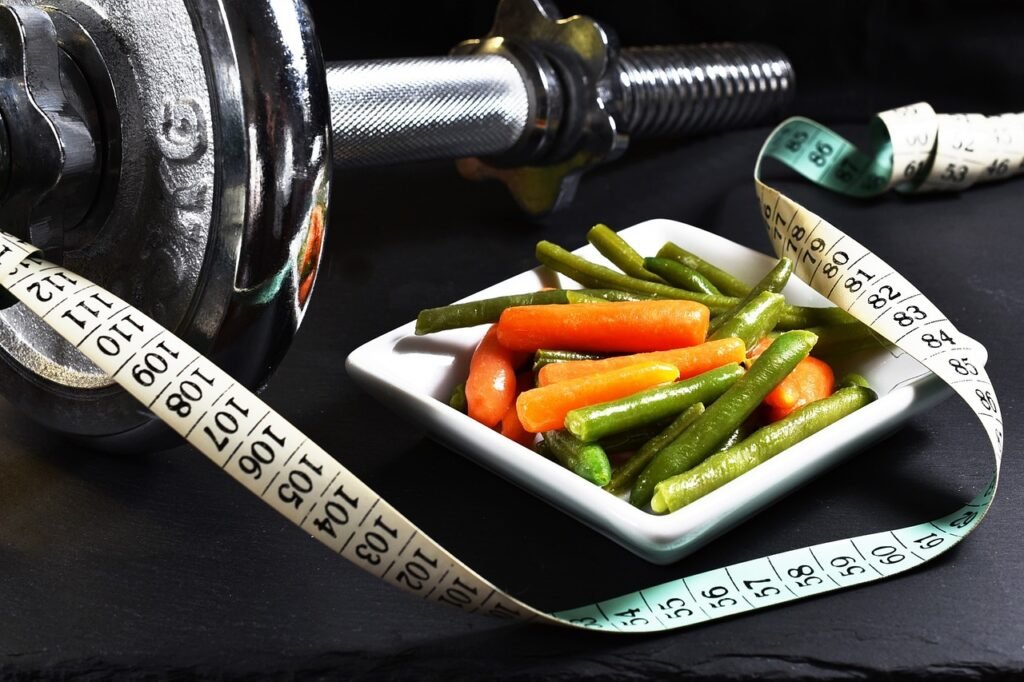Every weight loss journey begins with a single step—believing in yourself. I remember the day I realized my health was more important than any temporary comfort food. Your path to natural weight loss isn’t about punishing yourself with crash diets or impossibly low-calorie diet regimens. It’s about making sustainable, meaningful changes.
Weight loss isn’t a sprint; it’s a marathon of consistent choices and compassionate self-care. The most effective strategies focus on understanding your body’s unique needs. They also involve creating balanced nutrition plans and enjoying physical activities that make you feel strong and empowered.
The CDC recommends a steady weight loss of 1-2 pounds per week. This might seem slow, but it creates lasting transformations. Easy weight loss isn’t about extreme measures. It’s about smart, incremental changes that become lifelong habits.
Key Takeaways
- Sustainable weight loss requires lifestyle modifications
- Focus on balanced nutrition over restrictive dieting
- Regular physical activity is key for long-term success
- Gradual changes create more permanent results
- Mental health and motivation are key components of weight management
Understanding the Foundation of Sustainable Weight Loss
Starting a weight loss journey is more than just quick diet tips. It needs a full plan that lasts, not just a fast fix. The Centers for Disease Control and Prevention (CDC) says a good plan includes eating right, staying active, and managing stress.
Understanding the distinction between healthy and unhealthy dieting is crucial for achieving long-term success. Good diets aim for lasting changes, not just quick fixes.
Healthy vs. Crash Dieting: Key Differences
- Crash diets promise fast weight loss but can cause nutritional problems
- Good plans focus on balanced eating and slow changes
- Success comes from steady, small changes in diet
Setting Realistic Weight Loss Goals
Starting with reachable goals is the first step to managing weight well. Studies show tracking food can boost weight loss by up to 50%.
| Goal Setting Strategy | Success Rate |
|---|---|
| Self-monitoring | 20% improvement |
| Group counseling | 10x higher adherence |
| Calorie deficit | 10-15% reduction |
The Psychology of Weight Management
Weight loss is as much a mental battle as a physical one. Mindful eating helps, like taking 20 minutes to eat meals. It stops overeating and helps keep weight off.
Your weight loss journey is a marathon, not a sprint. Consistency and patience are your greatest allies.
By understanding these fundamental concepts, you can create a long-lasting diet plan. It’s about health and wellness, not just fast weight loss.
Creating a Balanced Meal Plan for Weight Loss
Creating a good diet and exercise plan needs careful thought and knowledge about nutrition. Your weight loss journey begins with a meal plan that helps your health goals. It should also keep you full and give you energy.
Essential Nutrients for Weight Management
For successful weight loss, you need the right nutrients in the right amounts. The Harvard Healthy Eating Plate model is a great guide:
- Half the plate: Fruits and vegetables
- One-quarter: Whole grains
- One-quarter: Healthy proteins
Portion Control Techniques
Learning to control your portions is key for healthy eating. Here are some ways to manage your food:
- Use smaller plates to reduce serving sizes
- Measure food portions using kitchen scales
- Practice the hand portion method
| Portion Guide | Recommended Serving Size |
|---|---|
| Protein | Palm-sized portion |
| Carbohydrates | Cupped hand portion |
| Vegetables | Fist-sized portion |
Meal Timing Strategies
Your metabolism gets a boost from smart meal timing. Go for low-calorie meal plans that spread out calories all day:
“Eat breakfast like a king, lunch like a prince, and dinner like a pauper.”
- Eat within 1 hour of waking
- Space meals every 3-4 hours
- Avoid late-night eating
Remember, aim to lose no more than 2 pounds a week. Don’t let your daily calories drop below 1,200 to keep your metabolism healthy.
The Role of Physical Activity in Weight Management
Physical activity is key for managing weight. The American Heart Association suggests 150 minutes of moderate exercise each week. This can greatly improve your metabolism and help burn fat.
“Movement is medicine for creating change in a person’s physical, emotional, and mental states.” – Greg Anderson
Knowing the right exercises can boost your metabolism. Studies show that adding physical activity to diet changes can lead to big weight loss. On average, people lose 7.2 kg in 6 months to 3 years.
- Moderate-intensity exercises burn calories effectively
- Strength training builds muscle mass
- High-intensity interval training (HIIT) accelerates fat burning
To burn fat, plan your workouts wisely. Aim to spend 1,000 kcal weekly. You might need to increase this to 2,000-3,000 kcal for lasting weight control.
| Exercise Type | Calories Burned (per hour) | Metabolic Impact |
|---|---|---|
| Brisk Walking | 300-400 | Low to Moderate |
| Running | 600-800 | High |
| Strength Training | 300-500 | Very High |
Pro tip: Always check with your doctor before starting any new exercise, even if you’re just starting out or have health issues.
By mixing up your workouts and staying active, you can change your metabolism and lose weight for good. The most important thing is to find exercises you like and can keep up with over time.
Mindful Eating Practices and Their Impact
Changing how you view food is more than just diet tips. Mindful eating is a powerful way to manage weight. It helps you connect with your body’s hunger and emotional signals.
Studies show mindful eating can greatly enhance your eating habits. About 10-20% of people notice fewer food cravings when they pay attention to their eating.
Understanding Hunger vs. Emotional Eating
It’s important to know the difference between hunger and eating due to emotions. This knowledge is key for lasting weight loss. Here’s how to tell the difference:
- Physical Hunger:
- Builds gradually
- Occurs in stomach area
- Willing to eat various foods
- Emotional Eating:
- Comes on suddenly
- Focused on specific comfort foods
- Triggered by stress or emotions
Developing Healthy Eating Habits
Adding mindful eating to your daily life can change your nutrition approach. Here are some easy steps to start:
- Eat without digital distractions
- Chew slowly and savor each bite
- Listen to your body’s fullness signals
- Practice portion control
“Mindful eating is about experiencing food more intensely — specially the pleasure of it.” – Susan Albers
By using these mindful eating practices, you can build healthier eating habits. These habits support lasting weight loss and better food relationships.
Smart Food Choices and Substitutions
Making smart food choices is key to natural weight loss. Your diet doesn’t have to be hard. It’s about making better choices that help you stay healthy and manage your weight.
“Small changes in your daily food choices can lead to significant weight loss over time.” – Nutrition Expert
Here are some smart food swaps for a low-calorie diet and healthy eating:
- Replace white rice with brown or wild rice for more fiber and nutrients
- Swap tortillas for lettuce wraps to reduce carbohydrate intake
- Choose Greek yogurt over flavored regular yogurts
- Use mashed cauliflower instead of traditional mashed potatoes
- Select whole-grain bread over white bread
Choosing nutrient-dense, low-calorie foods helps you lose weight in a healthy way. Here are some high-protein options:
| Food Item | Calories | Protein |
|---|---|---|
| Lean Chicken Breast (3 oz) | 140 | 26 g |
| Wild-Caught Salmon (4 oz) | 180 | 22 g |
| Greek Yogurt (1 cup) | 130 | 23 g |
Successful weight management is about making small, consistent choices. By making these smart swaps, you can cut 100-200 calories a day. And you’ll get the nutrients you need.
The Mediterranean Diet Approach to Weight Loss
If you’re looking for diets that work, the Mediterranean diet is a top choice. It’s not just for losing weight. It’s a way to live healthier and feel better overall.

This diet isn’t a quick fix. It’s a lifestyle that supports long-term health. It’s based on the eating habits of Mediterranean countries, focusing on whole foods and balanced nutrition.
Key Components of Mediterranean Eating
- Abundant fresh fruits and vegetables
- Whole grains and legumes
- Lean proteins like fish and poultry
- Healthy fats from olive oil and nuts
- Limited red meat consumption
Implementing Mediterranean Principles
Starting with the Mediterranean diet means making smart food choices. Your meals should be:
- Plant-based foods first
- Moderate amounts of lean proteins
- Less processed foods
- Regular fish meals
- Enjoying meals with loved ones
“Food is not just fuel, but a celebration of life and culture.” – Mediterranean Dietary Philosophy
Research shows the Mediterranean diet is great for losing weight naturally. It’s linked to lower heart disease risk, better metabolic health, and keeping weight off for good.
| Food Group | Recommended Daily Intake |
|---|---|
| Vegetables | 4-6 servings |
| Fruits | 2-4 servings |
| Whole Grains | 3-6 servings |
| Fish | 2-3 servings per week |
| Olive Oil | 3-4 tablespoons |
By embracing the Mediterranean diet, you’re not just losing weight—you’re investing in a healthier, more vibrant lifestyle.
Exercise Routines for Optimal Fat Burning
Finding the right exercise routines is key to burning fat and boosting your metabolism. A good workout plan can change your fitness journey. It helps you lose weight and get healthier.
High-Intensity Interval Training (HIIT) is a top choice for burning fat. A 2023 study showed HIIT can cut body fat and improve body shape. It works by short, intense workouts followed by quick breaks.
“The key to effective fat burning is not just exercising, but exercising smartly.” – Fitness Experts
- High-Intensity Interval Training (HIIT)
- Strength Training
- Full-Body Resistance Exercises
- Cardio Workouts
Strength training is also important for losing fat. A 2021 study of 58 studies found it can reduce body fat by 1.46% in 4 weeks. Lifting weights not only burns calories during the workout but also boosts your metabolism when you’re resting.
| Exercise Type | Calories Burned (per hour) | Metabolism Impact |
|---|---|---|
| HIIT | 400-600 | High |
| Strength Training | 300-500 | Moderate to High |
| Cardio | 200-400 | Moderate |
The Physical Activity Guidelines suggest two strength training sessions a week and 150 minutes of moderate aerobic exercise. Consistency is your greatest ally in achieving sustainable fat loss.
The best exercise routine is one you can keep up with. Start slow, listen to your body, and gradually get more intense. This helps avoid burnout and boosts fat burning.
Tracking Progress and Maintaining Motivation
Staying motivated on your weight loss journey can be tough. Studies show tracking your progress is key to lasting weight loss. Digital tools and apps turn your weight loss tips into real actions, keeping you on track.
Tracking your journey is more than just weighing yourself. Here are some ways to follow your progress:
- Digital fitness tracking apps
- Body measurement logs
- Food intake diaries
- Progress photo journals
Using Digital Tools and Apps
Use technology to make your weight loss journey more fun. Modern apps offer detailed tracking features. They help you see how far you’ve come.
| App Feature | Benefit |
|---|---|
| Calorie Tracking | Monitor daily intake accurately |
| Activity Logging | Record exercise and movement |
| Progress Visualization | See weight loss trends graphically |
Setting Milestones and Rewards
The CDC suggests losing 1-2 pounds a week. Aim for 4-8 pounds a month. Reward yourself with non-food treats like new workout gear or a massage when you reach your goals.
“Success is the sum of small efforts, repeated day in and day out.” – Robert Collier
Tracking isn’t just about numbers. It’s about understanding your body, celebrating small victories, and staying motivated on your weight loss journey.
Common Weight Loss Obstacles and Solutions

Starting your weight loss journey can be tough. Many face big challenges that make it hard to keep going. Knowing these obstacles helps you find ways to beat them.
“Success is not final, failure is not fatal: it is the courage to continue that counts.” – Winston Churchill
Here are some common weight loss hurdles and how to get past them:
- Metabolism Slowdown
- Your body’s metabolic rate can decrease during calorie restriction
- Combat this by incorporating strength training
- Consume adequate protein to maintain muscle mass
- Emotional Eating
- Stress triggers hormonal responses that increase food cravings
- Practice mindful eating techniques
- Develop alternative stress management strategies
- Plateaus in Weight Loss
- Metabolic adaptation can slow down easy weight loss
- Adjust your diet and exercise routine periodically
- Track progress beyond just scale weight
Here are some diet tips to help you overcome these challenges:
- Prioritize nutrient-dense foods
- Manage portion sizes
- Stay hydrated
- Get sufficient sleep
Pro tip: If you’re having trouble losing weight, talk to a healthcare professional. Medical issues like thyroid disorders can affect your metabolism and weight loss.
Remember, everyone’s weight loss journey is different. What works for one person might not work for another. Stay patient, keep trying, and be open to change for long-term success.
Building Long-term Healthy Habits
Changing your weight loss journey is more than just diets. It’s about making lasting lifestyle changes. These changes become natural habits over time. Studies show that successful weight management is about healthy eating habits that feel easy.
Lifestyle Changes That Last
Creating lasting habits means making small, gradual changes in your daily life. Here are some important steps:
- Replace processed foods with whole, nutrient-dense options
- Develop consistent meal preparation routines
- Practice mindful eating techniques
- Integrate regular physical activity into your schedule
“Sustainable change happens through consistent, small actions, not dramatic overhauls.”
Creating a Support System
Having strong social support makes your weight loss journey easier. Share your health goals with family and friends who support you.
| Support Strategy | Potential Impact |
|---|---|
| Share goals with trusted friends | Increased accountability |
| Join fitness or nutrition groups | Community motivation |
| Regular check-ins with health professionals | Professional guidance |
Remember, sustainable weight loss is a personal lifestyle transformation. Embrace gradual changes, celebrate small victories, and stay committed to your long-term health objectives.
The Role of Sleep and Stress Management in Weight Loss
On your path to natural weight loss, diet and exercise are just the start. Sleep and stress are key to boosting your metabolism and managing weight. Studies show that about one-third of U.S. adults don’t get enough sleep, which hinders weight loss.
Poor sleep can mess with your metabolism. Not getting seven hours of sleep a night can make you hungrier and crave sweets more. This hormonal shift makes losing weight much harder.
“Sleep is the secret weapon in your weight loss arsenal that most people overlook.”
Key Sleep and Weight Loss Strategies
- Maintain consistent sleep schedules
- Create a relaxing bedtime routine
- Limit caffeine intake, especially after 2 PM
- Practice stress reduction techniques
Sleep Impact on Metabolism
| Sleep Duration | Metabolic Impact |
|---|---|
| Less than 6 hours | Higher risk of weight gain |
| 7-9 hours | Optimal metabolic function |
| Irregular sleep patterns | Hormone disruption |
Stress management is also vital for weight loss. Chronic stress raises cortisol levels, which can increase hunger and fat storage. Mindfulness and relaxation can help your body lose weight naturally.
Your weight loss journey is about more than just diet and exercise. Quality sleep and stress control are essential. They work together with your diet and exercise to help you lose weight.
Conclusion
Starting a weight loss journey takes patience, commitment, and a whole-body health approach. The strategies you’ve learned are about lasting changes, not quick fixes. Research shows small, steady changes can lead to big results over three months, proving big diet changes aren’t needed.
Healthy eating habits are key to your transformation. Making smart choices like swapping half your pasta for veggies or watching portion sizes can make a big difference. It’s about finding a balance with food that meets your body’s needs, not strict dieting.
Your journey to wellness is more than just losing weight. It’s about knowing your body, meeting your unique needs, and finding a health plan that fits you. Focus on steady progress, listen to your body, and remember every small step matters. Whether it’s taking walks, eating nutrient-rich foods, or eating mindfully, your journey is your own.
Success comes from making sustainable habits part of your daily life. Don’t get down on temporary setbacks or daily weight changes. Your dedication to health is a journey of learning, adapting, and growing. Stay motivated, be gentle with yourself, and believe in the power of gradual, meaningful changes.




